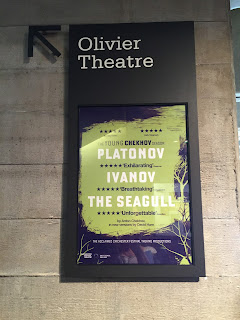The Olivier
is now housing the extremely successful run of Chekhov’s first three plays, which played at Chichester last autumn.
Comprising Platonov, Ivanov
and The Seagull, and using the same
company of actors, they can be viewed all in one day or on separate
occasions. I opted for the latter.
The
first play in the trilogy is Platonov,
which is not only a tricky one to pronounce (it is accented on the second
syllable) but is also a tricky one to categorise, probably due to the fact that
Chekhov is thought to have written
it whilst still a 20 year old medical student.
Luckily its original length of 7hrs has been reduced to a much more
manageable 2hrs 40mins and David Hare’s
new translation brings the play up there with the best of Chekhov’s work.
Platonov
of the title, brilliantly brought to life by James McArdle (complete with his natural Scottish accent), is a
feckless schoolmaster, undoubtedly in love with his long suffering wife, Sasha
but unable to resist the attentions of the women with whom he comes in
contact. Dissolute he may be, but,
thanks to McArdle’s bravura
performance, Platonov’s charms are
obvious. On paper, this immoral, self-absorbed
character should be completely charmless, but in this superb production we all
succumb to his magnetism.
One
of the many women eating out of the palm of his hand is Anna Petrovna (the
excellent Nina Sosanya) a widow
living on the large estate where everyone congregates. As with much of Chekhov, money, or lack of it, dominates Anna’s existence, as does
her infatuation with Platonov. Her first problem means she needs the help of
the local capitalists, whilst her love for the immoral school teacher, whilst
not exactly unrequited, is mainly based on passion.
It
often seems that Chekhov hasn’t got
much time for the characters he invents and no more so than here. The only truly good person is Sasha (Jade Williams) who, unlike everyone
else, actually listens to what is being said and doesn’t have a selfish bone in
her body.
Platonov
is a mish mash of farce, drama, comedy and tragedy but here, thanks to David Hare’s interpretation, Jonathan Kent’s tight direction and the
entire cast’s skill, it comes together as pure joy.
Ivanov at The Olivier
As
with the previous play, the stage for Ivanov
is set on a country estate, wonderfully realised by Set Designer Tom Pye. Nina Sosanya plays yet another Anna
Petrovna but this time her character has tuberculosis and is consequently
unlikely to see old age. One-sided
relationships abound once again, for, whilst Anna adores her egotistical
husband, Ivanov (Geoffrey Streatfield),
he is unable to reciprocate, preferring instead the charms of Olivia Vinall’s Sasha.
With
Ivanov we have yet another tortured
soul, but, unlike, Platonov, he is
totally without humour. The inhabitants
of this play fall into two categories, drunken bores and angst ridden seekers
of goodness knows what. Actually, I
will revise that, as a clutch of grotesques sporadically appear, who because of
their lack of emotional integrity leave the audience completely uninterested in
their fate. The exception to all this is Anna Petrovna, the “good” person in Chekhov’s second play.
Whilst
there are amusing moments, mostly provided by Sasha’s parents Pavel Lebedev (Jonathan Coy) and his very comical
greedy wife, Zinaida (Debra Gillett),
the title character lacks the attraction and verve of Platonov, languishing as
he does in frequent bouts of self-hate. Whilst the latter’s charm redeems his bad
behaviour somewhat, Ivanov’s self-absorbtion and self-pity doesn’t instill much
sympathy, even though one realizes he is driven by shame.
I am yet to see Jonathan
Kent’s take on The Seagull, although I do know the play. Based
on what I know and what I’ve seen at The Olivier so far, I realise that the common denominator with these three
plays appears to be the irresponsible landowner who fails in his task of
keeping the estate together, the rise of the middle classes, the appearance of
a doctor and/or teacher and the idealistic youth put down by the unimaginative
old skeptics.
Oh, yes, and I mustn't forget the inevitable gunshot!
Platonov, Ivanov and The Seagull, whilst similar in theme,
can be categorized as farce, melodrama and finally, stark realism. So
far, I much prefer his first foray into farce but will have to wait until
October before I can judge the latest take on his realistic third play.

